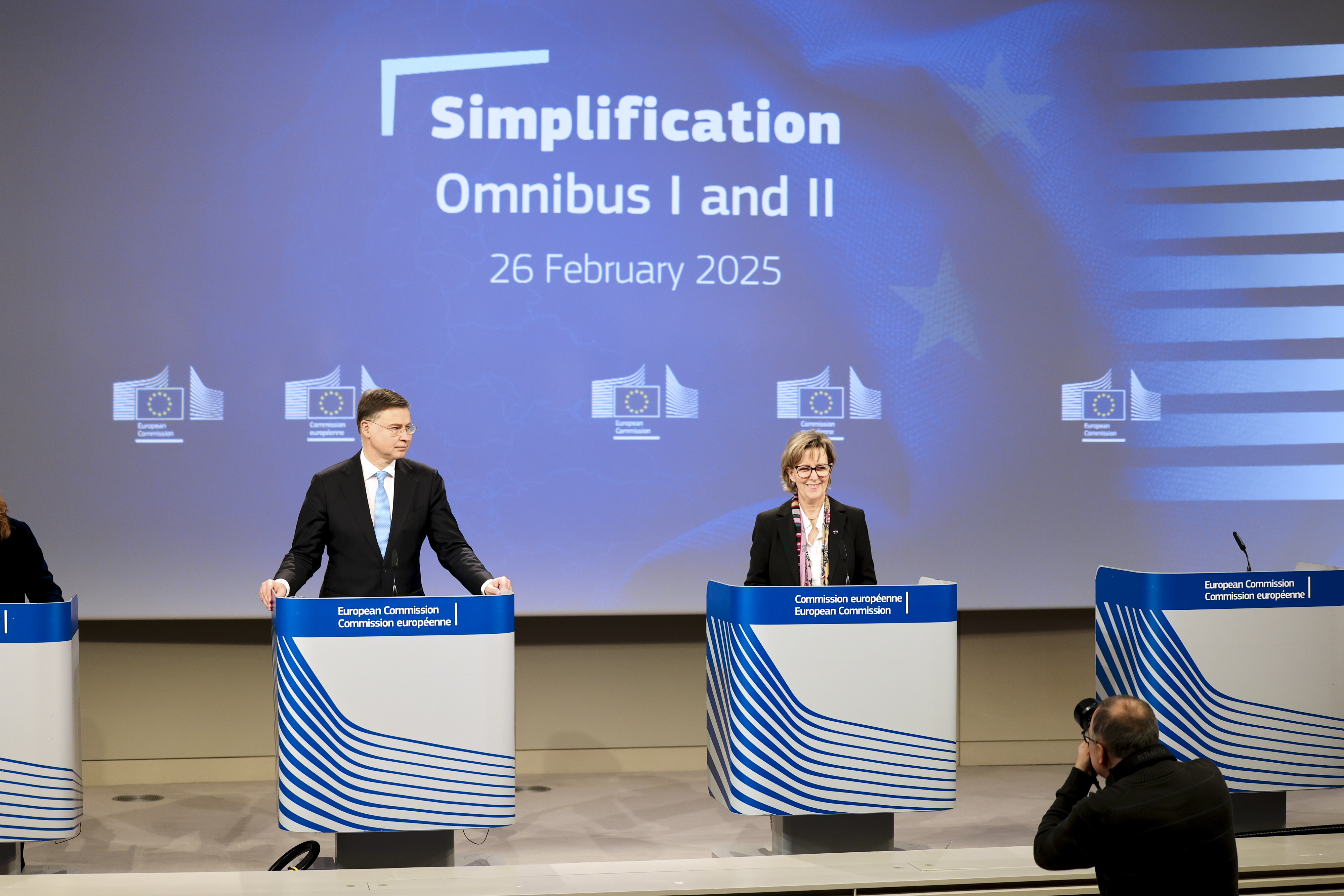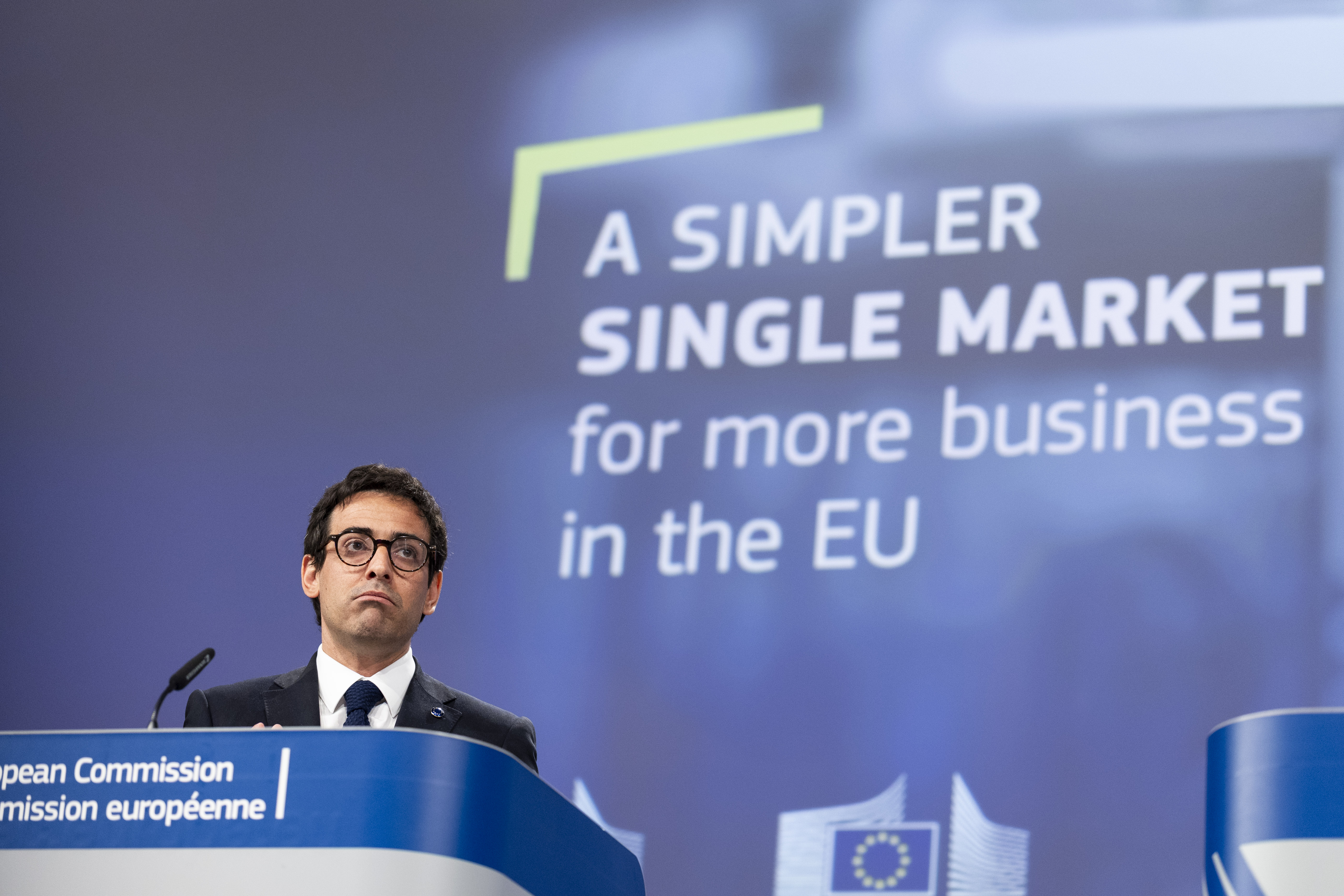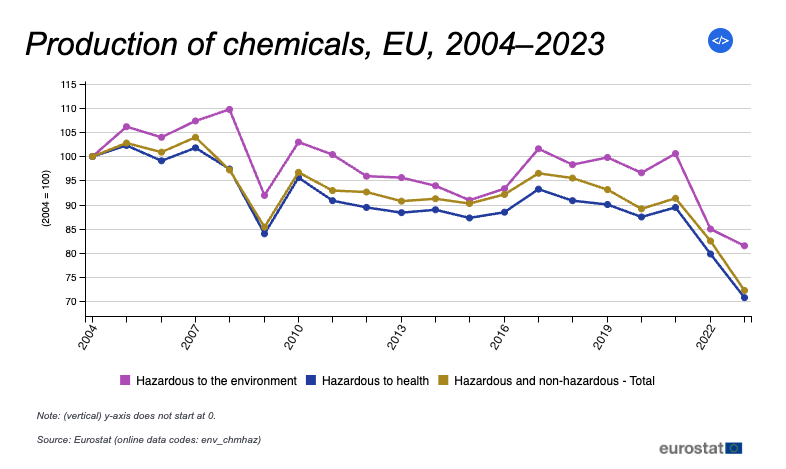Explainer
Brussels goes all-in on competitiveness with sweeping deregulation push
Europe is currently rolling back a wide range of its most ambitious agricultural, climate, and digital laws.
The EU Competitiveness Compass, published in January, set out a roadmap for simplification. The goal, according to the commission, is to “nurture Europe’s innate strengths, harness its resources and remove the barriers at European and national level.”
“Europe must be the place where tomorrow’s technologies, services, and clean products are invented, manufactured and marketed, as we stay the course to climate neutrality,” the document reads.
Since then, the EU has presented six so-called ‘Omnibus’ simplification packages filled with revisions to reduce the number of rules for businesses and sectors.
Omnibus I – Reporting simplification
The first Omnibus package targets four interlinked EU Green Deal laws (which all have long and cumbersome names): the Corporate Sustainability Reporting Directive (CSRD), the Corporate Sustainability Due Diligence Directive (CSDDD), the EU’s green taxonomy regulation, and the Carbon Border Adjustment Mechanism (CBAM).
The CSDDD, proposed after the 2013 Rana Plaza disaster, was meant to make big companies accountable for human and environmental harm in their global supply chains. It finally passed in 2024 after a decade of wrangling but hasn’t yet entered into force.
Still, it's first in line for rollback: the EU Commission, European Parliament and member states all want to narrow its scope to only the largest firms (1,000, 3,000 or even 5,000 employees, respectively), scrap the obligation to adopt climate transition plans, and remove civil liability clauses that would set clear legal standards for corporate accountability across the EU.
Civil rights groups and the EU Ombudsman have challenged the need to delay and narrow sustainability rules without adequate transparency or consultation. And legal challenges are still looming. Top economists have also pushed back.
“This proposal betrays the EU’s commitment to human rights and sustainability and would do little to prevent human rights and environmental harm in supply chains,” said Hélène de Rengervé from Human Rights Watch.
CSRD, which only recently entered into force, requires companies with over 250 employees to report on social and environmental impacts. Co-legislators now want to reduce the scope along the same lines as CSDDD.
The EU’s green taxonomy — its rulebook for what counts as a sustainable activity — is also being simplified. Under a July proposal, companies wouldn’t have to report taxonomy alignment for activities that make up less than 10 percent of their business. Financial institutions could opt out altogether, provided they don’t make any green claims. The commission says this will cut reporting by 64 percent for companies and 89 percent for financial institutions.
CBAM, a tariff on carbon-intensive imports including iron and steel, aluminium, cement, electricity, hydrogen and fertilisers, was also reduced. Full reporting will now only apply to shipments over 50 tonnes — a change that cuts scope of the law by 90 percent. The commission claims that 99 percent of emissions will still be covered.

Omnibus II – Investment simplification
The second Omnibus package is meant to streamline EU investment tools, including InvestEU, EFSI, and other legacy instruments. These have long been criticised for overlap and administrative complexity.
"Simplification of existing legislation is indispensable for boosting EU competitiveness," said Polish Europe minister Adam Szłapka, whose country held the EU rotating presidency at the time, backing the move.
The changes are meant to make it easier for SMEs and regional authorities to access these funds, with simpler reporting, in the hopes of boosting green investment and competitiveness. Whether this will lead to higher uptake or looser controls is still unclear.
Omnibus III – Agricultural policy simplification
The third Omnibus targets the Common Agricultural Policy (CAP).
Among the proposed changes are a lowering of grassland protection, discretion for member states to set water and peatland protections (rather than at the current EU level), and small farmers can be exempt from key environmental rules (the GAEC standards) altogether.
The commission also proposed a faster crisis payment mechanism and more flexibility for member states to opt out of EU-wide green conditionality.
The commission estimates this will save up to €1.58bn, while environmental groups, including WWF, warn this package strips away hard-fought essential climate and nature safeguards that align farming with EU climate and biodiversity goals.

Omnibus IV – Single market and green simplification
The fourth package, presented in May, focuses on the single market. It promises €400m in annual savings through lighter rules for nearly 38,000 “small mid-caps,” simplified product legislation, digitalised compliance procedures, and faster trade defence for SMEs.
It also includes: a two-year delay to due diligence rules under the Batteries Regulation, relaxed reporting rules for GDPR and a proposal to ease the F-gas Regulation.
F-gases, or fluorinated greenhouse gases, are extremely potent climate pollutants. Although little known, the IPCC estimates that they have contributed approximately 12 percent of global warming since 1750. Refrigerators, heat pumps and air conditioners are some of the biggest sources of emissions. The current law requires registration by around 38,000 firms. The commission now wants to scrap that obligation for 10,000 companies in 2026, which trade in products that have low emissions of these gases. According to the commission, earlier rules turned out to be "disproportionate", and while the new reduced scope won’t undermine climate goals. No assessment of climate impact has been made, however.
GDPR simplification The EU’s iconic data protection law is also being simplified. In May, the commission proposed lifting record-keeping duties for firms with fewer than 750 employees, as long as their data processing isn’t high-risk. The European Data Protection Board gave cautious support but warned of weakening safeguards. Civil society groups argue this assumes that small means no risk and call instead for better enforcement of existing rules.
Omnibus V - Defence readiness
The 'Defence Omnibus' proposal — which still needs approval from member states and parliament — is meant to slash red tape, clear the way for €800bn in new military spending over the next four years, and integrate Europe’s fragmented arms market.
One is a fast-track permitting regime for defence projects, with deadlines capped at 60 days. If national authorities fail to respond within that timeframe, the permit will be automatically granted.
Arms export licences for intra-EU transfers will be processed within three days, down from “the current six to seven weeks,” he added.
Another key element is a change to EU merger control policy. For the first time, “defence readiness” will be treated as a positive factor in merger reviews, giving a green light in principle to consolidations that contribute to a more effective European defence industry.
The commission hopes this shift could encourage more cross-border tie-ups between national champions such as Airbus, Thales (France) and Leonardo (Italy), which are in talks to combine satellite operations.
The initiative also includes measures to improve access to finance by easing eligibility for EU investment tools and clarifying that weapons, except for prohibited munitions like landmines, are allowed under the EU’s environmental, social and governance (ESG) rules.
Omnibus VI – Chemicals simplification
In July, the commission launched its fifth simplification package, this time targeting the chemicals sector. Framed as an industrial strategy, the plan promises €360m in savings through simpler labelling and regulatory procedures for hazardous substances, cosmetics, and fertilisers.
'The commission’s proposal lacks a solid evidence base, sidesteps public consultation, and ignores its own Better Regulation Guidelines. That’s not simplification – that’s maladministration'
But Green groups warn the plan weakens long-standing consumer protections, such as the right to know about hazardous chemicals in products they buy. Meanwhile, the commission says a broader PFAS ban is in preparation, though exemptions for strategic sectors are already planned.
"The commission’s proposal lacks a solid evidence base, sidesteps public consultation, and ignores its own Better Regulation Guidelines. That’s not simplification – that’s maladministration," said ClientEarth legal expert Julian Schenten.
The chemical manufacturing sector is the fourth-largest industry in the EU, comprising 30,000 companies and directly employing 1.2 million people.
It is estimated that about eight percent of deaths in Europe can be attributed to hazardous chemicals.

Other simplification efforts
Climate targets for 2040
After multiple delays, the EU's powerful Christian Democrats (European People's Party) have given Viktor Orbán's hard-right Patriots group control of the climate targets 2040 in parliament.
Socialists, Liberals and Greens had called for the urgent procedure to avoid this scenario. But the EPP rejected this call as well, thereby accepting outspoken climate change deniers taking a leadership role in the negotiation of the file.
The expectation is that they will use this role to try and delay agreement until after the UN climate summit taking place in Belèn in November.
"Flexibility cannot become a backdoor for deregulation. Any changes to the 2040 target fixed must be made conditional on respecting scientific rigour and ensuring social equity," said Italian socialist MEP Antonio Decaro earlier this month, after the commission unveiled its proposal.
Deforestation law
Adopted in 2023, the EUDR bans imports of soy, palm oil, and beef from recently deforested land. But implementation has stalled. The commission classified only four countries as “high-risk” — none of them major exporters like Brazil or Indonesia.
Since then, 11 member states have pushed to weaken the law further. The EU Parliament recently backed a non-binding resolution calling on the commission to scrap the current classification system and introduce two new categories: “negligible” and “insignificant”. Meanwhile, 18 agriculture ministers have asked for a formal delay to the regulation, which is due to enter into force in 2026.
"As global forest loss surges to record highs, the EU's political will to tackle it is failing," said Nicole Polsterer from NGO Fern.
Green Claims Directive
The EU’s anti-greenwashing law is also in limbo. The Green Claims Directive, which would ban vague or unverifiable terms like “climate neutral” or “eco-friendly,” would require companies to back up any green claim with scientific evidence and independent verification. But business groups have pushed back, arguing the rules are overly burdensome and risk stifling innovation.
In early June, the commission briefly appeared to shelve the proposal entirely. But this was later walked back after it triggered political chaos in Brussels. EU commission spokespersons later denied the withdrawal, but delays have continued and the directive remains stuck in trilogue. Its final fate is uncertain.
AI Act
With less than a month before key provisions of the AI Act take effect, pressure is building to delay its implementation. Tech firms like Google, Meta and Mistral, backed by several member states, say the lack of guidance and missing technical standards make compliance impossible.
At the centre of the problem is the AI Code of Practice, which was due in May but won’t arrive before the end of the year. Harmonised standards may not land until 2026.
The commission insists the timeline remains unchanged: rules for general-purpose AI models apply from August 2025, with enforcement starting in 2026. A Polish-led initiative in the Council is now pushing for SME exemptions and timeline flexibility. For now, though, companies are being told: prepare as planned.
This year, we turn 25 and are looking for 2,500 new supporting members to take their stake in EU democracy. A functioning EU relies on a well-informed public – you.
Author Bio
Wester is a journalist from the Netherlands with a focus on the green economy. He joined EUobserver in September 2021. Previously he was editor-in-chief of Vice, Motherboard, a science-based website, and climate economy journalist for The Correspondent.
Related articles
Tags
Author Bio
Wester is a journalist from the Netherlands with a focus on the green economy. He joined EUobserver in September 2021. Previously he was editor-in-chief of Vice, Motherboard, a science-based website, and climate economy journalist for The Correspondent.